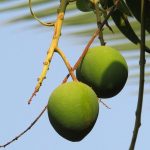African mango, scientifically known as Irvingia gabonensis, is a fruit native to Central and West Africa. It has gained significant attention in recent years for its purported weight-loss benefits. But is African mango really as effective as it claims to be? Let's delve into the evidence and explore what this fruit has to offer.
**How Does African Mango Aid Weight Loss?**
African mango contains a high concentration of a soluble fiber called pectin, which gives it its gel-like consistency. When consumed, pectin forms a viscous gel in the stomach, creating a feeling of fullness and reducing appetite. This helps individuals consume fewer calories and makes it easier to stick to a calorie-controlled diet.
Moreover, African mango has been shown to regulate glucose levels, reducing spikes in blood sugar after meals. This improved glucose control can reduce cravings and prevent overeating.
Additionally, African mango may boost metabolism, although the evidence supporting this claim is still limited. By increasing the body's metabolic rate, it may burn more calories throughout the day.
**Scientific Evidence**
Several studies have investigated the weight-loss effects of African mango. One study, published in the Journal of Ethnopharmacology, found that individuals taking African mango extract for 10 weeks lost an average of 28 pounds, compared to a placebo group that lost only 12 pounds.
Another study, published in the journal Obesity Research & Clinical Practice, showed that African mango extract, combined with a calorie-restricted diet, resulted in significant weight loss and reductions in body fat percentage.
**Potential Side Effects**
While African mango is generally considered safe for most people, some potential side effects have been reported, including:
* Gastrointestinal upset, such as nausea, abdominal pain, and diarrhea
* Headaches
* Nervousness
* Insomnia
If you experience any adverse reactions, it is important to discontinue use and consult a healthcare professional.
**Dosage and Availability**
African mango supplements are typically available in capsule or extract form. The recommended dosage varies depending on the product, but generally ranges from 1,000 to 1,500 mg per day.
African mango supplements can be purchased online or at health food stores. It is important to choose a reputable brand and consult a healthcare professional before taking any supplements.
**Conclusion**
African mango has shown promise as a potential weight-loss aid. Its high fiber content, ability to regulate glucose levels, and potential metabolism-boosting effects may contribute to its weight-reducing capabilities. However, it is important to note that African mango is not a miracle cure and should be combined with a healthy diet and exercise regimen for optimal results. Additionally, it is essential to consult a healthcare professional before taking African mango supplements to rule out any potential interactions or side effects.

